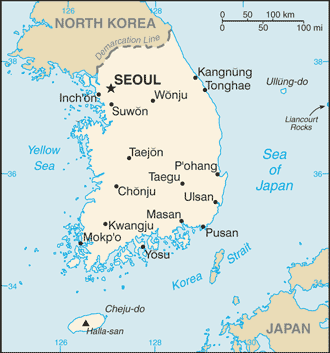Health officials in South Korea have issued a Tick Bite Alert Notice last week following the confirmation of the first Severe Fever with Thrombocytopenia Syndrome (SFTS) case of 2018.

Image/CIA
The case was confirmed in Jeju on April 9th.
Officials advise the public to take the following measures in preventing tick bites: Wear appropriate clothing (long sleeved shirts, pants, etc.) to cover any exposed skin during outdoor activities, change and wash clothing that was worn outside and bathe or shower promptly after returning indoors.
Preventing tick bites during outdoor activities, including agricultural work and hiking, is the most important step in protecting against SFTS. Individuals aged 50 and over who work in agriculture or forestry are at a proportionally greater risk of contracting the disease and should take special precautions to protect themselves.
The peak risk period for SFTS, which is transmitted through the bites of infected ticks, is from April to November, when ticks carrying the SFTS virus are most active. Since 2013, there have been 607 confirmed cases and 127 deaths.
Severe fever with thrombocytopenia syndrome (SFTS) is a newly emerging infectious disease. Symptoms and laboratory abnormalities are fever, thrombocytopenia, leukocytopenia, and elevated serum enzyme levels. Multiorgan failure occurs in severe cases, and 6%–30% of case-patients die. The syndrome is caused by the SFTS virus (SFTSV) (genus Phlebovirus, family Bunyaviridae).
Ixodid tick species are implicated as vectors of SFTSV.
- Lyme disease: New research on Borrelia burgdorferi persistence
- Lyme disease treatment: Some thoughts
- The history behind the Lyme disease controversy and what’s new in Lyme research
- Lone star ticks do not transmit the Lyme bacteria: Entomologist
- A look at the differences in geographical distribution of Lyme disease
- A new Lyme disease test: Dr Richard Marconi discusses the GLD Test
- Lyme disease, Stevia and the quest for better treatments
- Lyme disease: Borrelia biofilm in the body demonstrated
- Powassan virus: The spread is inevitable
- Lyme: Q & A with Paul Auwaerter, MD


One thought on “South Korea reports 1st Severe Fever with Thrombocytopenia Syndrome (SFTS) case of 2018: Tick Bite alert issued”